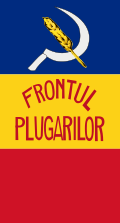Ploughmen's Front
|
Ploughmen's Front
Frontul Plugarilor |
|
|---|---|
 |
|
| Leader | Petru Groza |
| Founded | 1933 |
| Dissolved | 1953 |
| Split from | People's Party |
| Merged into | Romanian Communist Party |
| Ideology |
Republicanism Agrarian socialism Left-wing populism |
| Political position | Left-wing |
| Colours | Red |
| Party flag | |
 |
|
The Ploughmen's Front (Romanian: Frontul Plugarilor) was a Romanian left-wing agrarian-inspired political organisation of ploughmen, founded at Deva in 1933 and led by Petru Groza. At its peak in 1946, the Front had over 1 million members.
Begun in Hunedoara County, it quickly spread into the Banat, and then into the other regions of Romania. Groza, who had been a minister in Alexandru Averescu's People's Party cabinet (1926), aimed to improve the situation of the peasantry (which he believed had been betrayed by the main agrarian group, the National Peasants' Party), calling for a social security program in the countryside and tax reform favourable to small holdings. The group was also republican in ambitions, probably from the moment it was created (before 1940, Groza was recorded to have said "my last king was Decebalus, after whose death I became a republican").
In 1935, the organisation aligned itself with the outlawed Romanian Communist Party (PCR), an agreement inspired by the Stalinist Popular Front doctrine and signed in Ţebea (after negotiations overseen by Scarlat Callimachi).
During this period, the Ploughmen's Front never obtained more than 0.30% of the vote. Outlawed together with all parties in 1938, through a law passed by the authoritarian regime of King Carol II, it remained active in clandestinity during the dictatorial rule of Ion Antonescu (when Groza was detained in 1943-1944), and surfaced after its fall in 1944 and the start of Soviet ascendancy and influence (see Romania during World War II).
...
Wikipedia
